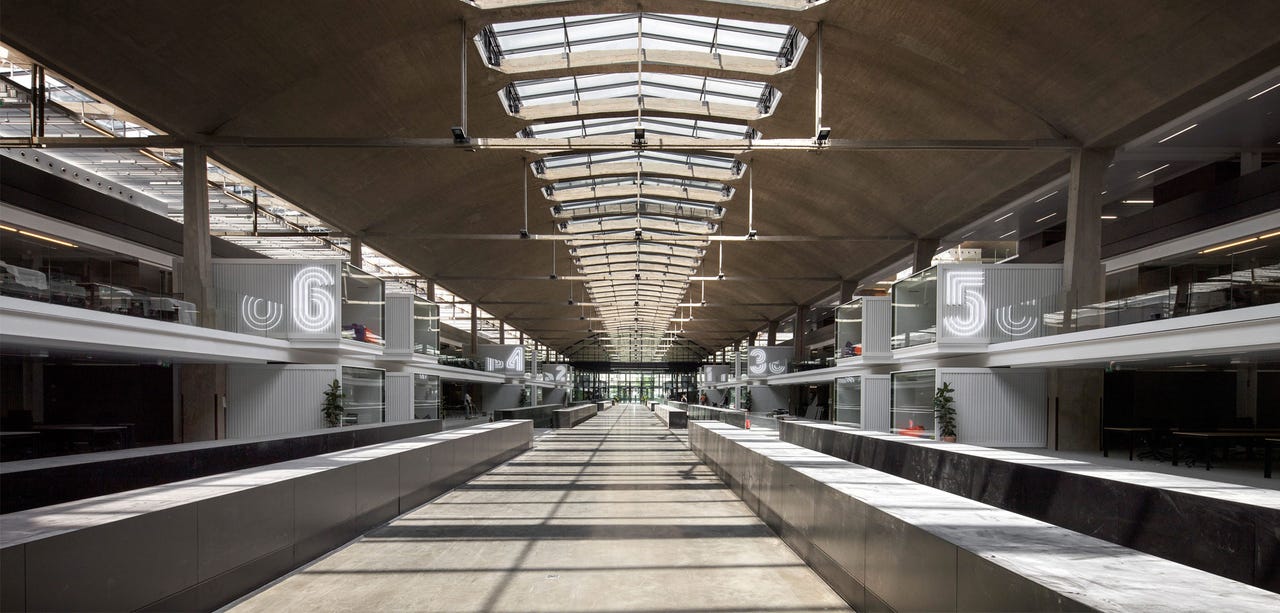Will Brexit let Paris overtake London as Europe's Silicon Valley?


Station F in Paris, the largest startup campus in the world, is another sign of the French capital's rise. (Image: Station F)
Even with the more recent big political changes in France and the US, it's June 2016's shock Brexit referendum result that continues to reverberate across Europe's business landscape.
In leading startup cities across Europe, questions are being asked about how Brexit will hit London. Could it now be possible that Paris' accumulating successes and momentum could knock London off its spot as the leading European center for tech entrepreneurship?
Fresh hope and optimism are certainly pumping through France's digital ecosystem, with France's new president Emmanuel Macron, a former investment banker, telling the world: "I want France to be a nation that works with and for startups, and a nation that thinks and moves like a startup."
Not long after Theresa May's disastrous June re-election in the UK, Station F, the largest startup campus in the world, launched in Paris. Station F is the creation of French entrepreneur and billionaire Xavier Neil who funded it with a €250m ($297m) investment.
SEE: The Brexit dilemma: Will London's start-ups stay or go? (TechRepublic cover story)
US and UK apply the most to Paris' Station F
More than 2,300 startups from over 50 different countries applied to the Founders Program. Station F director Roxanne Varza says most of the applications were from the US and the UK.
"A lot of startups tell us in their applications that factors like Brexit, Donald Trump or even high Silicon Valley prices have influenced their decision to apply to Station F," says Varza. "More recently, we're also seeing a Macron effect, meaning that companies are also excited about the new president and what he stands for."
Nicolas Colin, co-founder and director of entrepreneur site The Family, says they expected the UK government to adopt a very pro-business and pro-tech stance following Brexit.
"Unexpectedly it did the exact opposite," he says. "And now, following the snap election, British politics has entered a long era of uncertainty. This can only weaken London, thus making Paris stronger."
Read also: How professional cycling is being taken up a gear by technology | Before the next hurricane: Storm trackers and other survival tools for mobile and desktop users | Practical AI for the enterprise: Getting past vendors blowing smoke
According to a recent survey of 357 businesses by UK employers' group the CBI, which represents 190,000 UK businesses, over 40 percent of businesses say Brexit has already affected their investment decisions.
"There's a risk that we will become stand-still Britain if we do not rise to La République's challenge," says James Wise, a partner at Balderton Capital, a venture-capital firm in London.
"While France appears to have a renewed focus on shifting its economy towards one driven by technology and innovation, the UK's technology sector has had a much tougher year," he says, adding that former unicorns Powa Technologies and VE Interactive went into administration in the last 12 months.
London still leagues ahead of Paris?
While a Dealroom report for Q2 of 2017 showed France as Europe's leader for the number of venture capital rounds with 208, compared with the UK's 149, London saw record funding levels of €2bn ($2.38bn). However, in Q4 of 2016 France raised more than any other European country with €0.9bn ($1.07bn), while the UK raised €0.7bn ($0.83bn).
Improbable had raised $502m during Q2 and Farfetch $397m, but the report says the UK's funding success was not just driven by these mega-rounds.
"London is still leagues ahead of Paris," says Harry Briggs, partner at venture-capital fund BGF Ventures. "Generally, the tech scene in London remains very buoyant."
Briggs says he's noticed fewer French entrepreneurs moving to London, and a few returning from London to Paris, but hasn't heard of any UK founders moving to Paris. "I have heard that a few Fintech companies are hedging their positions by creating a European office, in case the UK were to lose passporting rights," he says.
However, Alice Zagury, co-founder and CEO of TheFamily, says, "What I know is that the VCs in London are seeing their requests for money from the European fund refused."
Gerard Grech, chief executive of Tech City UK, which supports the growth of digital businesses throughout the UK, says the initial shock of Brexit has given way to pragmatism and resourcefulness.
For now he still sees London as still having the advantage. "More than a third of Europe's tech unicorns [$1bn-valued businesses] are based in London and it is home to four of the continent's powerhouse VC investors: Index Ventures, Accel, Balderton Capital, and Atomico," he says.
Currently ranking first on the European Digital City Index, which compares how well cities support digital entrepreneurs, London is well ahead of Paris, which is ranked fifth. Stockholm is second, Amsterdam third, Helsinki fourth and Berlin is in sixth place.
UK is more nationalistic while Paris becomes more welcoming
But Robin Rivaton, CEO of Choose Paris Region, which has a 15-strong team dedicated to helping scale-ups in France, says there are only two worldwide capitals in Europe: London and Paris.
"They are the only European cities with around 10 million inhabitants," he says. "It's not a kind of arrogance, it's just a question of size. The quality of the cluster London has established in the financial industry depends a lot on the size and on the depth of the workforce."
Rivaton is in charge of the one-stop-shop that looks after UK investors coming into France after Brexit. He says the Paris region is changing because of the Brexit vote. While the UK has become more nationalistic, the French have become more welcoming.
He says businesses are discovering that because more people are speaking English, it's now possible to find high-value services and workers, such as software engineers and R&D researchers, who can do business in English.
Read also: Equifax exposes credit services' woeful IT, processes, security | Amazon is building a second HQ: Should your company do the same? | Trend Micro finds CEOs are spoofed the most by business email compromise
"It was quite difficult to find a workforce in the past, so the relative position of the Paris region compared with London has improved in recent years," he explains.
Rivaton says the number of tech companies Choose Paris Region has established in Paris over the last year has increased by one third, from 19 to 31. The number from North America has almost doubled, but Rivaton says this isn't just the effect of Donald Trump's election.
"There's a more positive regard for the Paris region as a tech hub on a worldwide level," he says.
Rivaton says his current focus is on transforming the R&D effort. With €19bn ($21.6bn) spent on R&D each year, his challenge is to convert it into new services, products and companies, and adds that the French Tech Ticket, which includes €45,000 ($53,500) financing, 12 months hosting in a co-working space, quick delivery process for visa and a dedicated help desk, is helping to attract more talent into the city.
Paris needs a healthier ecosystem
Damien Roch, who heads up the new Scale Hub program for global Paris-based accelerator NUMA, agrees that public initiatives like the French Tech Ticket have helped make Paris more attractive.
"Paris still suffers from its old reputation," he says. "We started as a non-profit in 2001 and nobody would believe in our mission to empower entrepreneurs, but now the market is increasingly attractive."
Scale Hub offers two levels of support. The first is practical so entrepreneurs do not get held up by red tape. The second is strategic, matching companies with big innovators who can open doors.
Colin thinks the focus on visa initiatives indicates that the problem is being addressed in the wrong way.
"Such visas clearly make a difference for healthy ecosystems where all entrepreneurs want to found their startup, like Silicon Valley," he says. "I wouldn't say Paris is there yet. Nobody says: 'The place to found my startup is Paris and nowhere else -- the only problem is the visa'."
He says the priority is to make Paris healthier as ecosystem.
Read also: How companies can make the most from open source | Equifax's big fat fail: How not to handle a data breach | Hive thinks it knows how to get the smart home buzzing
"Rewarding entrepreneurship; inspiring ambition; providing security of capital, talent, and regulatory flexibility in the growth phase; facilitating employees moving from one company to another. If all those are done, then people will simply want to join in, and a more flexible visa system will make a difference," he explains.
But, with its current progress, perhaps a hard Brexit alone will be all Paris needs to become Europe's Silicon Valley.
Tony Zappala, partner at tech investment fund Highland Europe, thinks the impact of a hard Brexit would be gradual but relentless.
"If larger companies base their operations in continental Europe to access the single market, less international talent can move to London, and it becomes more complicated for international investors to operate in the UK," he says.
"Progressively, more successful companies will be built elsewhere and that is where talent and money will continue flowing towards."
PREVIOUS AND RELATED COVERAGE
UK gov't outlines vague post-Brexit Digital Strategy
The UK's scheme relies heavily on today's biggest tech vendors and their contributions.
Will Amsterdam datacenters bloom amid Brexit confusion?
With the Netherlands, and Amsterdam in particular, already a rising force in the European datacenter market, it seems the UK's vote to leave the EU can only aid its ambitions.
Tech and Brexit: London is still Europe's top tech hub, but for how much longer?
London is still ahead of Berlin and other European cities on investment, but the Brexit vote casts a cloud of uncertainty over the future.
MORE ON FRENCH TECHNOLOGY
- France outlines plans to scrap petrol, diesel cars in favor of EVs
- UK and France propose fining Facebook and Twitter if extreme material left online
- French authorities close Windows 10 privacy investigation
- Can Halle Freyssinet, world's largest incubator, seal France's place in tech startup major league?
- French military launches eagles into the sky to take down terrorist drones
- Startup Republic: How France reinvented itself for the 21st century by wooing entrepreneurs to Paris (TechRepublic)